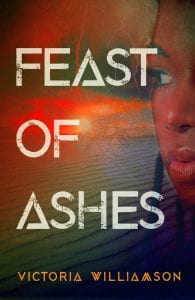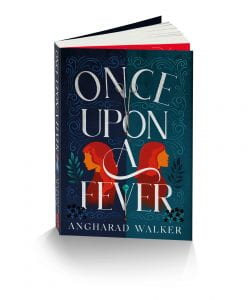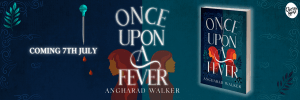
Neem Tree Press, 9781911107873
I will freely admit that dystopian novels are not my favourite genre, perhaps because I have been reading them for a VERY long time. However, I have read and enjoyed Victoria’s middle grade work, so I wanted to see what she imagined in this first YA novel.
As you would expect, the story is set in a dystopian future and where the population live in sealed domes, to protect them from the lethal environment outside. The central character, Adina is a teenager with all of the frustrations and longings of her age; what she does not expect is that her desire for a ripe apple will lead to the explosion that destroys her home and kills most of its inhabitants, including her parents. The small group of survivors have a matter of days to find refuge at Sanctuary Seven, the nearest habitation, before their bio filters stop working and they succumb to the deadly atmosphere.
This is a story that reminds me of the conflicts that have happened during my life around the wishes of big business, especially when genetic modification is the focus. The story is set in an African landscape that has basically been destroyed by the desire of multinationals to provide food as cheaply as possible, using non-western countries as test beds for their ideas. This need to feed the population, together with the pressing issues around the environment, is something that is very much at the heart of the eco-movements that are voicing concerns today. In contrast to this theme, we have the much more personal issues around Adina, her attitudes and the way that she has to deal with her guilt after the disaster. The story is set out in a simple timeline; dealing with life and attitudes before the event and then following the survivors as they face the natural dangers and also the potential threat to them, if they do not reach safety in time. We see the interaction of the characters and how they all react to their circumstances; in particular we see the gradual shift in the way that Adina thinks and acts, until we have the final scene that really packs a punch.
This is one of those stories that I cannot say I ‘enjoyed’, but that is perhaps not the purpose. It does however, make you think very long and hard about what we are doing to our world and in particular those parts that are still seen as ‘developing’. The author has given us a book to be mindful about and which will hopefully give its young readers a lot of food for thought.
About the Author
Victoria Williamson is an award-winning author who grew up in Scotland surrounded by hills, books, and an historical farm estate which inspired many of her early adventure stories and spooky tales. After studying Physics at the University of Glasgow, she set out on her own real-life adventures, which included teaching maths and science in Cameroon, training teachers in Malawi, teaching English in China and working with children with additional support needs in the UK. Victoria currently works part time writing KS2 books for the education company Twinkl and spends the rest of her time writing novels, and visiting schools, libraries and literary festivals to give author talks and run creative writing workshops.
at the University of Glasgow, she set out on her own real-life adventures, which included teaching maths and science in Cameroon, training teachers in Malawi, teaching English in China and working with children with additional support needs in the UK. Victoria currently works part time writing KS2 books for the education company Twinkl and spends the rest of her time writing novels, and visiting schools, libraries and literary festivals to give author talks and run creative writing workshops.
Victoria’s previous novels include The Fox Girl and the White Gazelle, The Boy with the Butterfly Mind, Hag Storm, and War of the Wind. She has won the Bolton Children’s Fiction Award 2020/2021, The YA-aldi Glasgow Secondary School Libraries Book Award 2023, and has been shortlisted for the Week Junior Book Awards 2023, The Leeds Book Awards 2023, the Red Book Award 2023, the James Reckitt Hull Book Awards 2021, The Trinity School Book Awards 2021, and longlisted for the ABA South Coast Book Awards 2023, the Waterstones Children’s Book Prize 2020, and the Branford Boase Award 2019.
Her latest novel, The Pawnshop of Stolen Dreams, is a middle grade fantasy inspired by classic folklore. Twenty percent of the author royalties for this book are donated to CharChar Literacy, an organisation working to improve children’s literacy levels in Malawi.
You can find out more about Victoria’s books, school visits and free resources for schools on her website: www.strangelymagical.com

 then you are really going to love this book.
then you are really going to love this book.